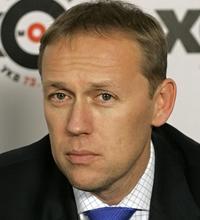Russian LDPR calls Lugovoi top parliamentary candidate

The Liberal Democratic Party of Russia called a main Britain’s suspect in Litvinenko’s killing case a top slot on its list for parliamentary candidates, Russian news reports said.
Andrei Lugovoi was chosen at a party congress to be second on its candidate list for the Dec. 2 elections, the reports said.
Lugovoi has been named by Britain as its chief suspect in last year's killing in London of Litvinenko, who died of poisoning by a rare radioactive isotope. Russia has refused Britain's demand that Lugovoi be extradited to face trial in the murder, saying that its constitution prevents the move.
The nomination of Lugovoi "is our response to the impudent proposition" that Russia change its constitution to allow the extradition, party leader Vladimir Zhirinovsky said, according to the Interfax news agency. "We do not interfere in the internal affairs of other states, and we will never allow anyone to interfere in the internal affairs of Russia."
In the election for the State Duma, the powerful lower house of parliament, seats will be distributed to parties based on the percentage of votes the parties receive nationally. As second on the party list, Lugovoi would be in a strong position to get a seat if the party gets at least 7 percent of the national votes - the barrier for being allotted seats. But a poll conducted last week by the respected VTsIOM polling organization showed the party would get about 6 percent of the vote.
Zhirinovsky has attracted wide attention for his party for more than a decade with his belligerent demeanor and extreme statements - including a vow to use giant fans to blow radioactive waste from Russia into the ex-Soviet Baltic countries and claims that AIDS and other diseases were imported into Russia from the United States.
The party was the largest vote-getter in the 1993 parliamentary elections, but its influence has declined. The party once held about 65 of the Duma's 450 seats but currently has only 30.
Litvinenko was an agent in the KGB and its post-Soviet successor, the FSB, but became a strong critic of the agency and of the Kremlin. He was granted asylum in Britain, where he became part of an exile circle of Kremlin critics including tycoon Boris Berezovsky and Chechen separatist Akhmed Zakayev.
Russia has requested the extradition of Berezovsky and Zakayev, but Britain has refused. Russia's refusal to extradite Lugovoi brought further tensions to Moscow-London relations. In July, Britain expelled four Russian diplomats to protest the Lugovoi matter and Russia in turn expelled four British diplomats.
Subscribe to Pravda.Ru Telegram channel, Facebook, RSS!


